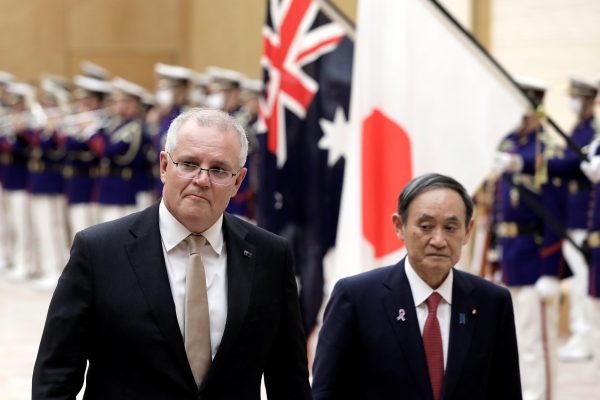The signing of in-principle — but incomplete — agreements has become something of the norm in recent decades. Leaders often announce the conclusion of negotiations with a signing ceremony which only outlines the key elements that have been agreed upon. Morrison’s delayed Tokyo visit due to Australia’s 2019–2020 extended bushfire season and the ensuing COVID-19 crisis could explain this.
The symbolism of Tokyo’s joint prime ministerial signing ceremony was significant but it is not clear what was achieved other than the political commitment to finalise the RAA at some point next year. Without a draft text having been released it is not possible to comment on all aspects of the RAA. But two substantive observations can be made.
First, the RAA is considered to be a ‘landmark defence treaty that will further deepen the countries’ strategic and security relationship’. According to the Australian and Japanese governments, the RAA will ‘facilitate greater and more complex practical engagement … and enhance inter-operability and cooperation’ between the Australian and Japanese militaries. The governments noted that it ‘will also support our joint involvement in broader multilateral exercises’ and will establish ‘streamlined arrangements to support the deployment of defence forces more quickly’.
Although the RAA is not a defence pact, it will encompass elements of what is commonly known as a Status of Forces Agreement (SOFA). These agreements facilitate defence cooperation between two militaries and allow for joint exercises, training and stationing of foreign military personnel within the host country. Australia has a number of such agreements in place, including with France, Malaysia, New Zealand, Singapore and the United States. Japan has limited experience with such agreements and is only a party to a 1960 SOFA with the United States.
A SOFA creates various immunities and exemptions for the visiting foreign forces from local civil and criminal laws. Those immunities may be either absolute or partial. For Japan, the US SOFA has resulted in numerous issues ranging from the criminal conduct of US marines in Okinawa, to environmental issues on US bases. There is considerable sensitivity about the conclusion of a SOFA by Japan that would grant widespread legal immunities to other visiting foreign forces.
Second, it is unclear whether under the RAA Australian military personnel would be subject to the death penalty in Japan. The Japan Times reported in June that a breakthrough had occurred in negotiations on this point and suggested Japan would waive the imposition of the death penalty. In its place Japan would apply the maximum sentence allowed for under Australian law. But there was no confirmation of this following the meeting between Morrison and Suga. Morrison refused to be drawn on this issue at his Tokyo press conference.
When repeatedly quizzed on the matter by Australian journalists all Morrison was prepared to confirm was that ‘Australia will comply with all of their obligations in relation to the death penalty’. It was reported at the time that these issues would be dealt with on a case-by-case basis, yet there was no clarity as to how such an approach could be applied operationally.
This begs the question as to what are Australia’s international legal obligations with respect to this matter, and those of Japan. Although Australia and Japan are both parties to the 1966 International Covenant on Civil and Political Rights (ICCPR) — one of the foundational United Nations human rights agreements — that treaty does not unequivocally bar the death penalty. The 1989 Second Optional Protocol to the ICCPR abolishes the death penalty and while that treaty has a total of 88 parties including Australia, Japan is not a party to the agreement.
Japan retains capital publishment and in 2019 carried out three executions, including one foreigner. Amnesty International reported 15 executions by Japan in 2018. Australia is strongly opposed to the death penalty having moved under federal law to abolish all forms of capital punishment in 1973. Australia is known for fiercely advocating on behalf of its citizens facing foreign executions, such as Andrew Chan and Myuran Sukumaran in Indonesia in 2015.
Australia’s track record suggests it is inconceivable that the Morrison government would leave ajar any prospect of Australian military personnel facing the death penalty in Japan on a ‘case-by-case’ basis. Yet talk of Australia complying with its international obligations carries little weight if Japan has custody of Australian’s who have committed a capital crime. In that scenario Japanese law will apply and it will be Japan that needs to meet its international obligations.
Australia could gently push Japan to abolish the death penalty but that would be a diplomatic long game. Resolving this issue to the satisfaction of both Canberra and Tokyo will be essential to the eventual signing of the concluded RAA and its entry into force, otherwise it could be a deal breaker.
Donald R Rothwell is Professor of International Law at the ANU College of Law, the Australian National University.

